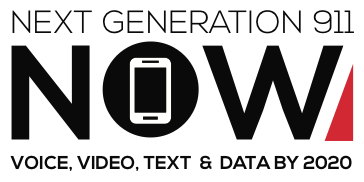What is NG911?
NG911 is a nationwide, standards-based, all-IP emergency communications infrastructure enabling voice and multimedia communications between a 9-1-1 caller and a 911 center, and on to responders in the field.
Citizens in need of emergency assistance will be able to transmit photos, videos and other existing and future forms of broadband data and applications, in addition to voice, to 911 professionals. This could include streaming video from an emergency incident, photos of accident damage or a fleeing suspect, or medical information, all of which would greatly aid 911 professionals in assisting the caller or communicating with field responders and incident commanders.
Moreover, when a highly reliable, secure, standards-based NG911 system is deployed nationwide, 911 centers (known as “Public Safety Answering Points” or PSAPs) will have enhanced tools at their disposal for more effective and efficient response, and increased ability to interoperate with other PSAPs or transfer all functionality in the event of a major disaster.
Why Does Accelerating NG911 Matter?
Accelerated implementation of NG911 service across the U.S. will provide significant benefits and improved emergency services for the public, 911 professionals, and first responders. Accelerated implementation of NG911 will:
Increase compatibility with emerging communication trends
Consumers expect that calls to 911 will support commonly used modes of communications such as text, video and other multimedia applications. Accelerating implementation of NG911 services will increase compatibility with current and emerging communication technologies and increase confidence in the nation’s 911 system.
Enhance the flexibility, reliability and survivability of the nation’s 911 system
Fully IP-based and standards-based NG911 systems will be more nimble, survivable, and resilient during disasters, allowing for more flexible network routing options to mitigate outages and reduce vulnerabilities that all lead to improved outcomes for the public.
Improve emergency response for the public and emergency responders
NG911 will improve the public’s access to emergency response services by allowing 911 centers to exchange additional data and information with responders, improve call processing times, enhance situational awareness, and increase responder safety.
Reduce the cost of operating the 911 system
Coordinated and accelerated deployment of NG911 services will reduce the long term cost burden of operating dual legacy and NG911 systems for a prolonged period. Available funding will be put towards new technology, not maintaining the old system.
What Happens If We Do Not Act to Deploy NG911 Faster?
A failure to act in a timely and effective manner would result in a number of negative consequences. Inaction would:
Prolong nationwide deployment, increase costs, and delay NG911’s many benefits
An uncoordinated, unfunded transition to NG911 would take many years – likely more than a decade – with many 911 Centers and state/local 911 authorities deferring deployment due to resource limitations. The result will be a patchwork system with individual agencies having widely varied capabilities and limited interoperability with others.
Risk incompatibility with emerging communication trends
Text and multimedia applications represent the bulk of communications for many Americans today, especially the younger generations, or those of the deaf and hard of hearing communities. Consumers expect that emergency requests to 911 will support these modes of communications.
Result in missed opportunities for improved emergency response
The emergence of advanced broadband communications puts much more powerful capabilities in the hands of the public. Without NG911, however, 911 professionals will not be able to provide the increased information available from the public to first responders.
Create technological obsolescence and increased security risks
The commercial marketplace has already migrated from outdated technologies to advanced IP-based technologies. 911 network providers are also seeking to retire legacy infrastructure, while still preserving essential public safety communications. Continued reliance on an outdated infrastructure will render 911 systems obsolete and technologically isolated while delaying implementation of more robust reliability and security measures that can be taken in the mature NG911 environment.
What Needs to Happen?
To make ubiquitous NG911 service a reality, the following areas need to be addressed:
Funding – Particularly during the transition from legacy systems to NG911, a significant amount of targeted funding is necessary. Long-term ongoing costs must also be addressed, including new and/or refined funding mechanisms to ensure that NG911 funds are sufficient, available, cost effective, and sustainable.
Governance – Necessary governance structures, policies, and regulations should be developed at all levels of government to facilitate NG911 planning, deployment and operations.
Technology – Technical standards and best practices, including those designed to promote cybersecurity, need to be developed, completed, or refined via accredited standards development organizations.
Operations – NG911 operational standards and best practices, including those addressing regional deployments, interconnection, data/resource sharing, and network monitoring need to be developed, completed, or refined.
Education – A broader understanding of NG911 is needed, with a focus on its capabilities and benefits, as well as the limitations of current 911 services and the significant consequences of a delayed and/or uncoordinated deployment of NG911.
